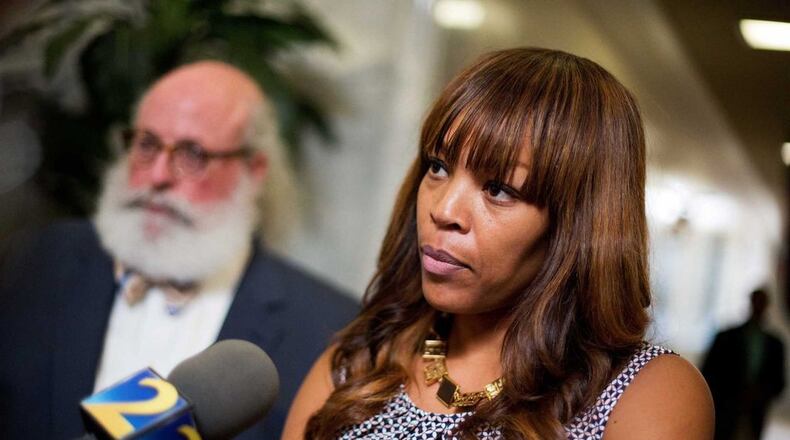Last summer, Maya Dillard Smith, the state’s new ACLU director, stood in a hallway of the Georgia Court of Appeals describing why she was there to help the Ku Klux Klan.
The state had rejected the Klan's offer to pick up trash on a North Georgia roadway, saying approval would, in essence, create state-sanctioned speech. The ACLU argued the government can't determine what type of speech is good and what is bad.
As I noted then, the scene provided a peculiar American moment: Dillard Smith, a trim African-American lawyer with stylish bangs, stood next to ACLU attorney Alan Begner, a pony-tailed Jewish lawyer with a fluffy white beard. And here they were together fighting on behalf of an organization that historically despised them.
“Today, the issue is the KKK, tomorrow it will be Black Lives Matter when it is no longer politically correct, ” Dillard Smith said. Asked how she, a black woman, felt about the Klan, she said, “What I believe is irrelevant here. Our constitution affords free speech to everybody.”
Now she's leaving the ACLU, saying the organization is not according her the same free speech in discussions around the suddenly white-hot issue of transgender people being allowed to use bathrooms that match their gender identity.
In fact, she accused the organization of pushing an agenda, of being politically correct in its internal discussions, and that any questioning of motives to fight for transgender rights was seen as aberrant thinking.
“In this issue, if you raise questions, then you’re branded an anti,” she said.
The entire issue of transgender rights has, for many folks, seemed to have fallen out of the sky, from being something rarely discussed to becoming a pressing presidential election concern. It exploded last month when the Obama administration issued a recommendation that public schools let transgender students use bathrooms matching their gender identity. The ACLU is involved in lawsuits on the issue.
But Dillard Smith, the mother of three girls, said the transgender rights movement has wider implications and “unintended consequences” to “biological women and girls.”
She said the fight on behalf of the Klan was “part and parcel” of what the ACLU is.
“They take on the most controversial issues, and we need to have wide-ranging discussions. So I asked questions (about transgender issues). What are the boundaries? What are the implications? How comfortable are we supposed to feel as people?
“I’m not interested in being politically correct. I want an honest discussion. Where is the marketplace of ideas on this?”
The free speech organization was uncharacteristically quiet on this one when I called Thursday, tongue-tied because of HR concerns. But one ACLU member, who did not want to be named, said Dillard Smith’s concerns were duly — and frequently — noted and the sides simply had a philosophical split concerning strategy and direction.
The ACLU released an email from James Esseks, the ACLU’s director of the LGBT & HIV Project. The email doesn’t mention Dillard Smith but was surely written with her in mind. It said the ACLU has fought anti-transgender legislation in at least 17 states and is in the midst of a “major civil rights battle.”
“Restrooms have been center stage in prior civil rights fights, including for African-Americans, for men and women around the Equal Rights Amendment, in the context of fighting for access for people living with disabilities, and during the peak of the AIDS crisis, when homophobia fed fears of gay people using restrooms.”
I assume they directed the “phobia” toward their former director.
Dillard Smith said the issue isn't simply theoretical with her. She said she and her two younger daughters met three 6-foot-tall women with deep voices in a public john and her "girls were visibly frightened." She said she was "ill-prepared" to explain what was up.
Many people are like her. The whole issue is new to them and is uncomfortable. I know it is with me.
It’s estimated that transgender people are about 0.3 percent of the population, so they don’t have a lot of political pull. And they’re still perfect targets for bullying and jokes.
Dillard Smith brought up the issue of safety and “those who’d take advantage of others.”
There has been a lot of fear generated in this debate, images of burly men who dress up as girls so they can enter bathrooms and run off with your daughters. It’s a primal fear, but it’s horse dung, an urban legend.
The issue is “ever-changing and moving really quickly,” Dillard Smith said, summing up the reason our brains aren’t absorbing the ramifications. She added “most Americans are somewhere in the middle.”
Most Americans are in the middle of many things. You just don’t expect that any of them would have been an ACLU leader.
About the Author
The Latest
Featured



